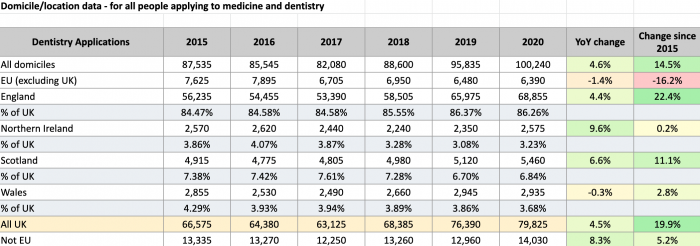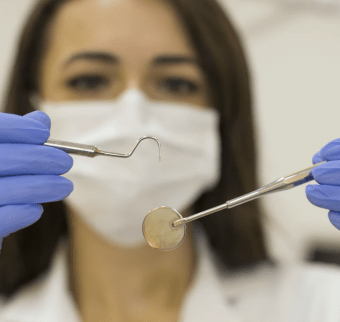A popular choice
As record numbers apply to study dentistry, we explore the routes into the profession for young people
Dentistry is already one of the most competitive courses in the UK to apply for and as applicant numbers are increasing, they will need to have strong academic and technical skills and some work experience behind them. It’s easy to see why it’s popular – demand for dentists is rising, providing reassurance of a job after graduating. Graduates are paid very well just six months after graduating and they are highly respected members of the community who make a difference to people’s lives.
Dentistry courses at UK universities have seen a record number of applicants since the Covid-19 vaccination roll-out began this year, new Freedom of Information request data reveals. The latest UCAS figures, which have been collated by dental supplier, Kent Express, showed the number of applicants for dentistry courses rose to 100,240 this year from 95,835 in 2019.
UCAS course data has also shown dentistry to be among the UK’s top ten most popular courses in the UK to study with a 20 per cent increase in applicants in the past 14 years, despite the increasing cost in tuition fees. There have also been rises in each age group (up to 25 and under) opting to study dentistry, with 19-year-olds highlighted as the most common age group. However, the data shows there has been a decline in mature students aged 35 or over that have applied to study dentistry in the UK with a 32 per cent decrease in the last 10 years.
Notably, dentistry has seen a huge increase in female applicants with a 72 per cent difference between female and male applicants in the last year. The profession, which historically has been a male-dominated industry, has seen more women apply for dentistry courses year-on-year since as early as 2007.
“Dentistry is one of the few truly gender-balanced industries in the UK,” said Chris Moffatt, a spokesperson for Kent Express. “The profession is continually evolving, becoming more sophisticated with a greater focus on holistic, preventative care rather than dealing with restorations and tooth extractions when it’s too late. Digital dentistry is another growth area, creating new opportunities to enhance the patient experience.
“Tuition fees don’t seem to be putting students off, perhaps because average salaries for dentists in the UK far exceed the national average. Prospects for successful graduates are excellent. Dentistry offers a clear career path with the opportunity to become a specialist in your area of interest. Setting up your own practice is a target for many, plus there’s the option to work internationally. It’s a rewarding career that can offer huge satisfaction. In a single visit, a dentist can transform a patient’s everyday life.”

Routes into dentistry
To become a dentist, it is compulsory to complete a 5-year dentistry degree. After completing the 5-year course, you will then need to complete one to two years of postgraduate dental training on the job. You may be able to apply for a 4-year dental course if you already have a minimum 2:1 degree in biology or chemistry, or a biomedical subject. Some universities offer a longer 6-year course which includes a ‘pre-dental year’ for students without the science qualifications, but with proven academic achievements. The General Dental Council (GDC) regulates all dental schools in the UK so that they have a very similar content.
Careers for school leavers
There is no apprenticeship route to dentistry because you must have the Bachelor of Dental Surgery degree to become a dentist. If you want to get straight to work in a dental practice, rather than go to university, then you can look at other roles within a dental practice which have options for school leavers (as well as a degree route):
- Dental nurse – working as a trainee while studying for the level 3 diploma in dental nursing or the national certificate in dental nursing
- Dental hygienist – 2-year diploma
- Dental therapist – diploma in dental therapy after A levels
- Dental technician – BTEC national diploma or SQA higher national certificate in dental technology after GCSEs
Entry requirements
In England, you will usually need at least three A levels, usually at grades AAA to ABB, including chemistry and biology. In Scotland, SQA Higher Entry Requirements (by end of S6) are AAAAB Higher + B Advanced Higher (AABB S5 minimum for consideration). In Scotland, additional requirements are Biology and Chemistry at grade A, Maths/Physics and English/ESOL at grade C. Advanced Higher in Biology or Chemistry at grade B.
When you apply for the dentistry course you might be asked to take a BioMedical Admissions Test or the University Clinical Aptitude Test. These test the skills that you need to successfully complete the course (skills like data analysis, critical thinking and scientific reasoning). They will also want to make sure that your communication skills are good and that your hand-eye coordination is excellent. Other requirements may include immunisations, testing for blood-borne viruses, a health questionnaire and a DBS check.
Some universities like you to have undertaken work shadowing a dentist before you apply. Some short-term weekend or holiday work experience in a dental practice as a minimum will display to the university that you know what the job entails and that you have made the effort to gain the experience. They will want to know that you have a passion and enthusiasm for the profession. However, in Scotland universities have dropped this requirement because of COVID-19 – though they may look for alternative experiences outwith a dental setting that provide evidence of attributes they are looking for (check with your chosen university).
Note: This article has used recent FOI data from UCAS which highlights statistics associated with dentistry applications in the UK for the following courses: Pre-clinical, Clinical Dentistry, Others in Medicine and Dentistry, and Combinations within Medicine and Dentistry. The complete dataset can be found at https://docs.google.com/spreadsheets/d/1jjUzXaB37sZ9vtYra4zseIrbpfnL439eo8qfrz_DXMs/edit?usp=sharing


You must be logged in to post a comment.